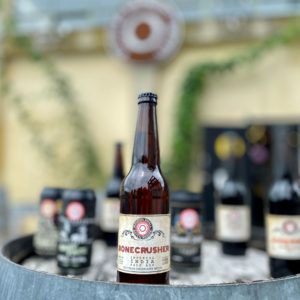Every now and then a beer comes along and takes you on a journey — back in time, to another place or an experience you’ve half-forgotten.
 A late-2021 release from Bootleg in the Waikato, Bonecrusher Imperial IPA, did just that.
A late-2021 release from Bootleg in the Waikato, Bonecrusher Imperial IPA, did just that.
If you know the name Bonecrusher, well you know. If not, saddle up … we’re going for a little ride.
I grew up in a household where horse racing and beer were part of Saturday afternoon life – and into the evening where it became red wine and cigars and my father listening to the harness racing from Addington or Alexandra Park.
I had my first bet when I was 10 or 11, with $5 I found on the ground at the Copperfield Mall, an outdoor shopping area in Paraparaumu Beach that possibly doesn’t exist anymore. After getting a Saturday morning haircut, I saw the money just lying there in a garden bed. It was an absolute fortune for a boy who got $6 a week delivering the Evening Post; the packets of notes and coins scattered on the road every Thursday at the bus-stop on the corner of Poplar Ave and Matai Road in Raumati where a group of us picked up our papers each evening.
Quite why I wanted to gamble my surprise wealth is beyond me. I was probably operating from the easy-come-easy-go point of view. What’s more worrying is why my father let me.
My dad was an amateur gambler with a professional attitude. An intellectual gambler if such a thing exists. He had huge accounting books with detailed statistics for every racetrack in New Zealand, all weather conditions, distances of races, lead-up form of winning horses, the weight they carried, the dividends they paid. We were one of the first families I knew of who had a computer – all so my dad could transfer his system from paper.
His arcane system told him what to bet on. It was definitive and relatively restrictive. He never went outside it. But he invested in tiny amounts $1 a win, $3 a place. The irony is that he was permanently in the black thanks to his one personal quirk. Every meeting he would take two 50c trebles using his Air Force service number, which I can still remember: 6-4-8-5-8-6. One night at the trots in January 1978, the numbers came up: two rank outsiders and the favourite in the last race. Paid $10,000. We got a new car.
I was lured in by his system. I was good at maths and the numbers appealed. I would literally watch over his shoulder he entered the data, made the calculations. And I would listen alongside him to the races being called. But I also picked my own horses and pretended to invest. I too kept a ledger of my would-be bets. Invariably I “lost”. No system, you see.
One of the debates I always had with dad was that I felt his system was too scientific. That it didn’t account for what I’d now call intuition, or perhaps sentimentality. Looking back, I romanticized horse racing. First, I loved the smell of grass, manure and cigarette smoke, the form guides (Turf Digest, Best Bets, Friday Flash). I loved the horses themselves. Their poise and elegance. And I fell in love with individual horses — some of them the superstars (Grey Way, Show Gate, Uncle Remus, Balmerino) some of them also-rans who failed to live up to my misplaced faith.
The day I found $5 I invested it on Captain Scott, a steeplechaser (so it must have been winter), and Indian Gold. Both came in. I made money. I was hooked. When I went to boarding school my first new friends were those I spied with the Turf Digest poking out of their back pocket.
Some of the best years of my life were working for the New Zealand Press Association in Australia during the mid-1990s and covering the Spring Racing Carnival in Melbourne – the highlight being when Jezabeel won the 1998 Melbourne Cup and I could not fit all my winnings into my wallet.
These days I don’t gamble anymore. I shook that off a while back. Some days now I’m in the camp that regards racing as a cruel pastime, but I’ve also seen enough champion race horses up close to know there’s something about them — to my eye anyway — that suggests they have a love for what they do.
Though I no longer bet, I do like to watch the best horses (Black Caviar, the wonder mare who won 25 races in a row all seemingly at a jog) and will watch important races on YouTube.
And there are certain horse races from history I can watch again and again. Rough Habit winning the Stradbroke Handicap in 1992 is one of them. The other – whenever you want that jolt of electricity up and down your spine – is the 1986 Cox Plate when Bonecrusher and Our Waverley Star went hoof-to-hoof like two heavyweights backed by an outstanding commentary from Bill Collins: “the big red won’t give in …. Bonecrusher races into equine immortality. It’s still called the Race of The Century by race fans.

Bonecrusher, outside, beats Waverley Star in the Cox Plate
Bonecrusher, nicknamed Big Red, remains a legend of the Kiwi turf and I like the fact that Bootleg are honouring the thoroughbred breeding and racing culture that’s so entrenched in the heart of the Waikato. And yes, there’s a part of me that likes to be transported back to another era when it was rugby, racing and beer.
And the beer? Well like Big Red it’s sleek and powerful with a big heart. I crushed mine.